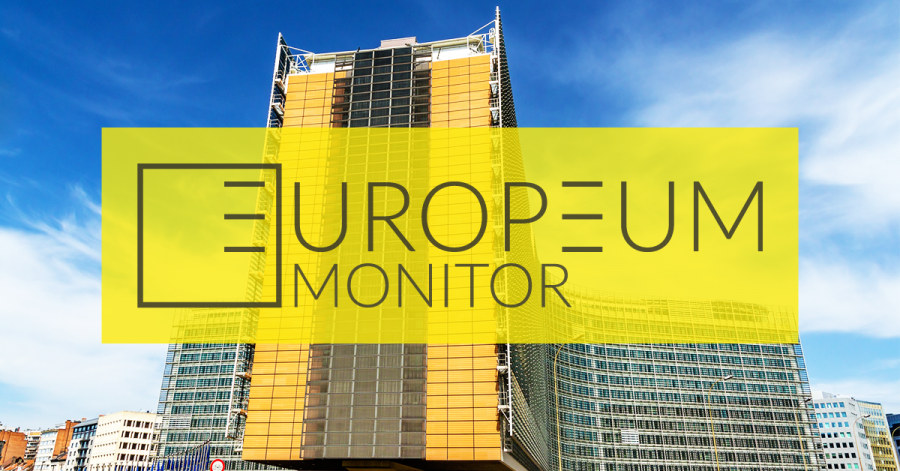The Future of Europe under construction
The latest edition of our EU Monitor series and its author Piotr Maciej Kaczyński analyzes the first nine speeches of members of the European Council in the framework debate on the Future of Europe in the European Parliament, from January to September 2018.
The latest edition of our EU Monitor series and its author Piotr Maciej Kaczyński (our Associate Research Fellow and Member of Team Europe-Warsaw) analyzes the first nine speeches of members of the European Council in the framework debate on the Future of Europe in the European Parliament, from January to September 2018.
- The ongoing debate on the future of European integration is a rolling stone. It lasts and evolves since the very early stages of the integration process decades ago. In the past, there were various cleavages between member states that were – more or less – useful in understanding the debate.
- There were the wealthier states and the pooper nations, the net contributors and the cohesion states, the free market economies and socially protective economies. There were the new member states who argued for solidarity and the Scandinavian states who argued for transparency. There were those who argued for deeper integration, and those who were happy with the status quo. There were sound economies and troubled ones. There was important unemployment in some states and shortages of workers elsewhere. All those differentiations were reconsidered with the exit of the United Kingdom from the Union.
The current context of the debate has been framed by a number of events in recent years. First, the post-Brexit referendum reality, in which negotiations the EU is negotiating terms of a loose-loose agreement. Second, a series of devastating socio-economic and migratory crises in Europe has taken a significant toll on the mood of European societies. Third, a number of terrorist attacks on European soil in recent years further contributed to an increase of public fear, and potentially – to a new trend of closing in of societies.
All leaders referred to the catalogue of European values of the EU treaties and the Charter of Fundamental Rights. What in the past seemed like an obvious statement in recent years – and in all the speeches – became an important element of the debate on the future of Europe.
The nine presented visions on the future of Europe reflected on many policy areas. Sometimes the leaders made more concrete proposals, some others have referred to the Commission scenarios, yet many underline that the main role of the European Union is not to replace its member states, but to empower them by creating an added value.
Europe has changed. Business as usual cannot continue. This is the basic starting reflection of the current debate. The only way for a “carry on” of the Commission scenario to take place seems to be the default option if no agreement exists elsewhere. Failing to do more might however be destructive for those who want to do more and no longer wish to wait. This is why this is not the preferred, or even probable, option.
The full article is availiable through the PDF button on the (bottom) right.
Associate Research Fellow
EU institutional and political affairs, European domestic and foreign policies, Polish foreign policy
Publications series
Raising awareness about the inner workings of the European Union and how they impact the influence of the Czech Republic within EU structures.
Related articles
- EU MONITOR | From boom to bust: How uncoordinated policies halted solar power deployment in Czechia
- EU MONITOR: Putin's Disinformation & Misinformation Campaign
- EU MONITOR: Recharging the Czech EU Presidency
- National Convention on the EU: Conclusions and implementation of the outcomes of the Conference on the Future of Europe
- EU MONITOR: Geothermal energy and the Visegrad group
- EU MONITOR: Is EU leading the way to becoming a global change in business and human rights?
- COMMENTARIES: European Council meeting on 25 and 26 March
- European Council Summary (17–21 July 2020)
- EU Council Commentary: No progress in MFF and recovery fund
- EU MONITOR: Czechs and the Post-2020 Multiannual Financial Framework
- EU MONITOR: Czech Perception of the EU Defence Policy
- EU MONITOR: Brexit, now what? Examining the future of Central and Eastern European security post-Brexit
- EU MONITOR: An Arduous Path: Are Bulgaria, Croatia and Romania Ready to Join the Area?
- EU MONITOR: The challenges of the military integration in the EU: an approach to the heterogeneity of weapon system categories
- EU MONITOR: Eurozone Reform: A Victim of Political Economy
- EU Monitor: The Amazon Wildfires and Environmental Conservation: What Can the EU do?
- EU MONITOR: The Original Sins of the new European Commission
- RECOMMENDATIONS: Priroties of Czech Republic for summit in Sibiu
- What EU Policy to Expect from the incumbent Czech Government?
- Commentary: EUCO Meeting in October 2018
- Europe awaits: German GroKo and what it means for European partners
- Andrej Babiš and the European Union: what to expect in 2018?
- The European Agenda on Migration: missing pieces towards a common migration policy
- Principles over Security? The Impact of the Upcoming Danish Exit from Europol
- When politics get in the way of policy: Energy Union at a standstill
- From Renzi with Love: Italy's Constitutional Referendum
- Assessing EU development cooperation: from infancy to maturity?
- Embedding NATO into the European Union Global Strategy: the missing link?
- Not a Leap but a Step in the Right Direction: Mogherini’s Structural and Personnel Reform of the EU’s Diplomatic Service
Staroměstské náměstí 4/1
Prague 1 - Staré Město
110 00
tel.: +420 212 246 552
email: europeum@europeum.org
https://www.europeum.org


